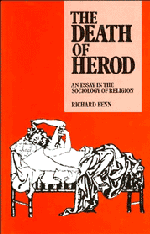Book contents
- Frontmatter
- Contents
- Acknowledgments
- Introduction
- 1 Two methodological viewpoints: the priestly and the prophetic
- 2 Description, interpretation, and explanation: modes of analysis
- 3 Levels of observation and of analysis: making the right choices
- 4 “What is going on here?” The role of the observer and the beginnings of theory
- 5 The search for useful concepts: evil and charisma
- 6 The making of a theory
- Epilogue
- References
- Author index
- Subject index
- Index of biblical citations
4 - “What is going on here?” The role of the observer and the beginnings of theory
Published online by Cambridge University Press: 07 January 2010
- Frontmatter
- Contents
- Acknowledgments
- Introduction
- 1 Two methodological viewpoints: the priestly and the prophetic
- 2 Description, interpretation, and explanation: modes of analysis
- 3 Levels of observation and of analysis: making the right choices
- 4 “What is going on here?” The role of the observer and the beginnings of theory
- 5 The search for useful concepts: evil and charisma
- 6 The making of a theory
- Epilogue
- References
- Author index
- Subject index
- Index of biblical citations
Summary
TRIAL, SACRIFICE, OR COLLECTIVE SCAPEGOATING? THE NEED FOR A THEORY
Even if there were no reason to question Josephus' version of events which he could not possibly have witnessed himself, the events themselves are ambiguous enough. Take the trials of the sons Alexander and Aristobulus for their alleged sedition against Herod. In the second chapter I discussed the trial before Caesar, which resulted in some hope for reconciliation and even fairness for both father and sons. At the second trial of these two sons, Josephus tells us, Caesar was absent, and in his place were the two presidents of Syria, Saturninus and Volumnius, and an assembly of about 150 magistrates (Antiquities XVI.11.2). In this “trial,” Herod was clearly in no doubt about his sons' guilt and did not seek a judgment on the matter; instead he came alone and before the assembly made an accusation “very unlike what a father should say about his sons” (Antiquities XVI.11.2; Josephus 1969: 355). Josephus describes Herod as being nearly beside himself with rage and open to no persuasion whatsoever. No one spoke for the sons, and the sons did not speak for themselves, although they had done so, you will remember, before Caesar. As a result, “the members of the council, being agreed that they were in no position to soften him or effect a reconciliation, confirmed his authority” (Antiquities XVI.11.3; Josephus 1969: 357).
- Type
- Chapter
- Information
- The Death of HerodAn Essay in the Sociology of Religion, pp. 110 - 131Publisher: Cambridge University PressPrint publication year: 1992



